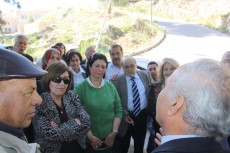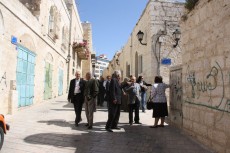The delegation started its tour by walking in the world heritage site; Star Street and the Nativity Church, then visited Bethlehem municipality where Arch. Issam Juha, mayor deputy and CCHP director, and the Governor of Bethlehem Abdul Fatah Hamayel, and a crowd of audience welcomed the delegation.
Arch. Juha pointed out that Palestine contains significant world heritage sites and the most important one which has global dimension is the Historic City of Bethlehem and the birthplace of Jesus Christ, the first site in Palestine that has been inscribed on the World Heritage List among other sites Palestine is nominating.
Governor Hamayel emphasized on the important of preserving cultural heritage, and the efforts that CCHP and the ministry of Culture is doing in this field, noting the great status of the Nativity city.
 H.E. Al-Barghouthi, ministry of Ministry of Culture, reviewed the priorities of the annual plan for 2013, and stressed on the importance of emphasizing of the cultural discourse in all of the ministry programmes and the development of various programmes such as encourage reading and adoption of meetings and competitions, and support the cultural reality in the Jerusalem city in order to preserve its status in the formation of the Palestinian cultural identity, and organizing awareness campaigns of the important of cultural heritage, in addition to databases in the fields of culture for institutions and individuals.
H.E. Al-Barghouthi, ministry of Ministry of Culture, reviewed the priorities of the annual plan for 2013, and stressed on the importance of emphasizing of the cultural discourse in all of the ministry programmes and the development of various programmes such as encourage reading and adoption of meetings and competitions, and support the cultural reality in the Jerusalem city in order to preserve its status in the formation of the Palestinian cultural identity, and organizing awareness campaigns of the important of cultural heritage, in addition to databases in the fields of culture for institutions and individuals.
The delegation then visited Bethlehem Heritage Museum and the Arab Women's Union and the Palestinian Heritage Centre, and the Art exhibition "400 years of the Palestinian Creativity", organized by Bank of Palestine in coordination with George Micheal Al-Ama, then visiting Solomon's Pools in Artas. The tour ends in Dar Al-Bader building in the historic city of Battir which CCHP has rehabilitated in 2007 with fund from the Government of Sweden - Swedish International Development Cooperation Agency "Sida" through the United Nations Educational, Scientific and Cultural Organization "UNESCO" - Ramallah Office, and is currently used as the Battir Eco-Museum.
Mr. Michael Nasser, director of the eco-museum welcomed the delegation and gave an overview of the village and the museum, where after the delegation had a traditional meal there made by local ladies of Battir.










